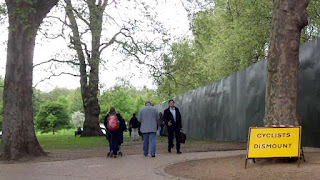Last week I had the rare misfortune to have to drive a car through London in the middle of the day. The journey between Shepherds Bush and Putney must have taken about an hour, for a distance of about 4 miles. It would have been quicker walking, although with the amount of clutch-pumping I was doing, driving was pretty good exercise. What was causing the congestion? No evidence of accidents or roadworks, and it was the middle of the day rather than rush hour. This I guess is a typical experience for anyone who makes that journey on a regular basis.
No doubt if you are knowledgeable about the local roads you can find a circuitous route to avoid some of the delay, making the adjoining residential roads noisier, more polluted and more dangerous for pedestrians, children and cyclists. The council have taken some measures to thwart such rat-running, with one-way streets and the like, but with limited effect.
This situation is exactly the kind of thing that Boris Johnson needs to get to grips with in his new term of office. Congestion is a significant cost to the economy: the hour I wasted was an hour of productive work lost, and there were no doubt plumbers, couriers, taxi drivers, computer repair people, goods vehicles, personal trainers, carpet fitters, salespeople, antique dealers, etc., etc., the whole Yellow Pages of professions and businesses, all caught up in the same queue and all losing an hour's work. Scale that up London-wide over a year and you have a massive productivity problem that is holding the London economy back.
What to do about it? Unfortunately Boris has no answers. Conservative ideology seemingly prohibits regulations restricting the right to drive, and he's set his face against road pricing as well. Boris is an incorrigible optimist who seems to think that problems solve themselves, through the magic of freedom of choice and free enterprise.
One answer would be to build more roads. This is impossible in London, because there is no spare space. People don't tolerate elevated motorways any longer. Tunneling is a possibility, but is eye-wateringly expensive - far too expensive in the age of austerity, especially if there is no road-pricing to pay for it. And of course there is the fundamental problem that more roads brings more traffic, which simply moves the congestion problem to somewhere else, where you haven't built a tunnel yet.
Part of the congestion problem is that people don't see a realistic alternative to driving. Buses aren't much of an alternative if they're caught up in the same congestion as the cars. For most people, cycling isn't an alternative because even residential roads are perceived as too dangerous for cycling - mainly because they're full of the rat-running traffic I referred to earlier trying to avoid the congestion hotspots. So people are driving distances of less than a mile in some cases, distances that are cyclable by anyone of average fitness. We know at least 50% of London car journeys could easily be cycled - we also know the main reason people don't cycle is fear of traffic, although 30-40% of people would like to cycle. In simple terms, there is no good reason why London can't be like Amsterdam.
There really is very little point in Boris's investments in cycling - the bike hire scheme, the "superhighways" - because they don't get people out of their cars. That is because these investments don't address the reason why people drive rather than cycle in the first place - safety. Bike hire is for the amusement of tourists, and for a small band of brave commuters avoiding the escalating cost of tube travel. But according to TfL, very few people have switched from cars to hire bikes. The Superhighways are almost entirely superficial - they look nice in parts, but all around the blue paint there are dangerous junctions and an encyclopedia of safety problems that have been ignored by TfL because solving them might cost money and/or disrupt the flow of motor traffic. That's the flow of people in motor vehicles who in a significant number of cases would rather be cycling, but don't because the superhighways aren't safe.
My appeal to Boris is this: stop treating cycling as some sort of expensive, taxpayer-funded play scheme. Cycling is not a game, it is a transport mode, and one that is well-adapted to the age of austerity by virtue of its low infrastructure and low end-user costs. This is a city that desperately needs a bold strategy to relieve it of congestion. Make cycling in London safe and that will stand as a worthy legacy, with lower transport costs, better public health and an improved environment. Do nothing and London will fall further behind its European competitors, who already have more efficient transport systems in which cycling is an increasingly integrated and important part.




